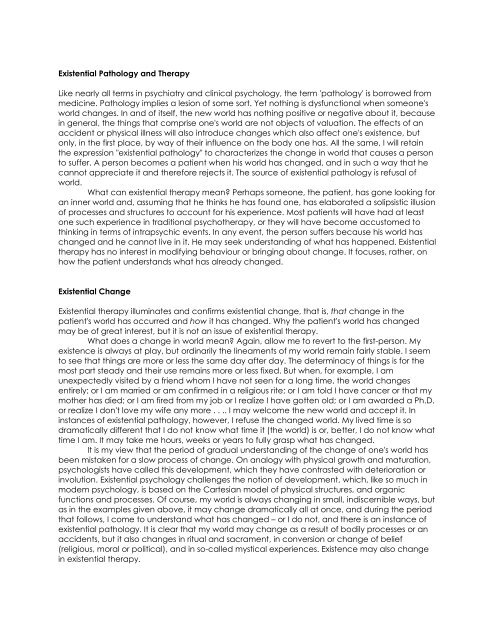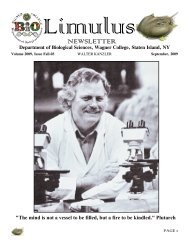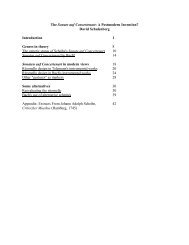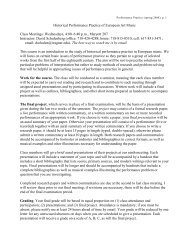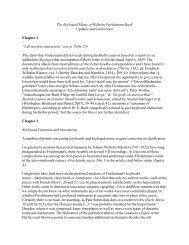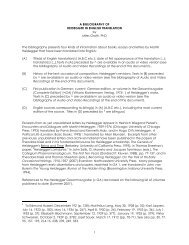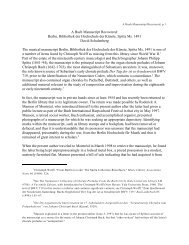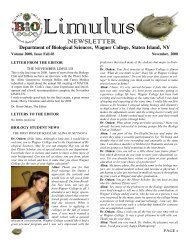SEVEN PAPERS ON EXISTENTIAL ANALYSIS ... - Wagner College
SEVEN PAPERS ON EXISTENTIAL ANALYSIS ... - Wagner College
SEVEN PAPERS ON EXISTENTIAL ANALYSIS ... - Wagner College
You also want an ePaper? Increase the reach of your titles
YUMPU automatically turns print PDFs into web optimized ePapers that Google loves.
Existential Pathology and Therapy<br />
Like nearly all terms in psychiatry and clinical psychology, the term 'pathology' is borrowed from<br />
medicine. Pathology implies a lesion of some sort. Yet nothing is dysfunctional when someone's<br />
world changes. In and of itself, the new world has nothing positive or negative about it, because<br />
in general, the things that comprise one's world are not objects of valuation. The effects of an<br />
accident or physical illness will also introduce changes which also affect one's existence, but<br />
only, in the first place, by way of their influence on the body one has. All the same, I will retain<br />
the expression "existential pathology" to characterizes the change in world that causes a person<br />
to suffer. A person becomes a patient when his world has changed, and in such a way that he<br />
cannot appreciate it and therefore rejects it. The source of existential pathology is refusal of<br />
world.<br />
What can existential therapy mean? Perhaps someone, the patient, has gone looking for<br />
an inner world and, assuming that he thinks he has found one, has elaborated a solipsistic illusion<br />
of processes and structures to account for his experience. Most patients will have had at least<br />
one such experience in traditional psychotherapy, or they will have become accustomed to<br />
thinking in terms of intrapsychic events. In any event, the person suffers because his world has<br />
changed and he cannot live in it. He may seek understanding of what has happened. Existential<br />
therapy has no interest in modifying behaviour or bringing about change. It focuses, rather, on<br />
how the patient understands what has already changed.<br />
Existential Change<br />
Existential therapy illuminates and confirms existential change, that is, that change in the<br />
patient's world has occurred and how it has changed. Why the patient's world has changed<br />
may be of great interest, but it is not an issue of existential therapy.<br />
What does a change in world mean? Again, allow me to revert to the first-person. My<br />
existence is always at play, but ordinarily the lineaments of my world remain fairly stable. I seem<br />
to see that things are more or less the same day after day. The determinacy of things is for the<br />
most part steady and their use remains more or less fixed. But when, for example, I am<br />
unexpectedly visited by a friend whom I have not seen for a long time, the world changes<br />
entirely; or I am married or am confirmed in a religious rite; or I am told I have cancer or that my<br />
mother has died; or I am fired from my job or I realize I have gotten old; or I am awarded a Ph.D.<br />
or realize I don't love my wife any more . . .. I may welcome the new world and accept it. In<br />
instances of existential pathology, however, I refuse the changed world. My lived time is so<br />
dramatically different that I do not know what time it (the world) is or, better, I do not know what<br />
time I am. It may take me hours, weeks or years to fully grasp what has changed.<br />
It is my view that the period of gradual understanding of the change of one's world has<br />
been mistaken for a slow process of change. On analogy with physical growth and maturation,<br />
psychologists have called this development, which they have contrasted with deterioration or<br />
involution. Existential psychology challenges the notion of development, which, like so much in<br />
modem psychology, is based on the Cartesian model of physical structures, and organic<br />
functions and processes. Of course, my world is always changing in small, indiscernible ways, but<br />
as in the examples given above, it may change dramatically all at once, and during the period<br />
that follows, I come to understand what has changed – or I do not, and there is an instance of<br />
existential pathology. It is clear that my world may change as a result of bodily processes or an<br />
accidents, but it also changes in ritual and sacrament, in conversion or change of belief<br />
(religious, moral or political), and in so-called mystical experiences. Existence may also change<br />
in existential therapy.


